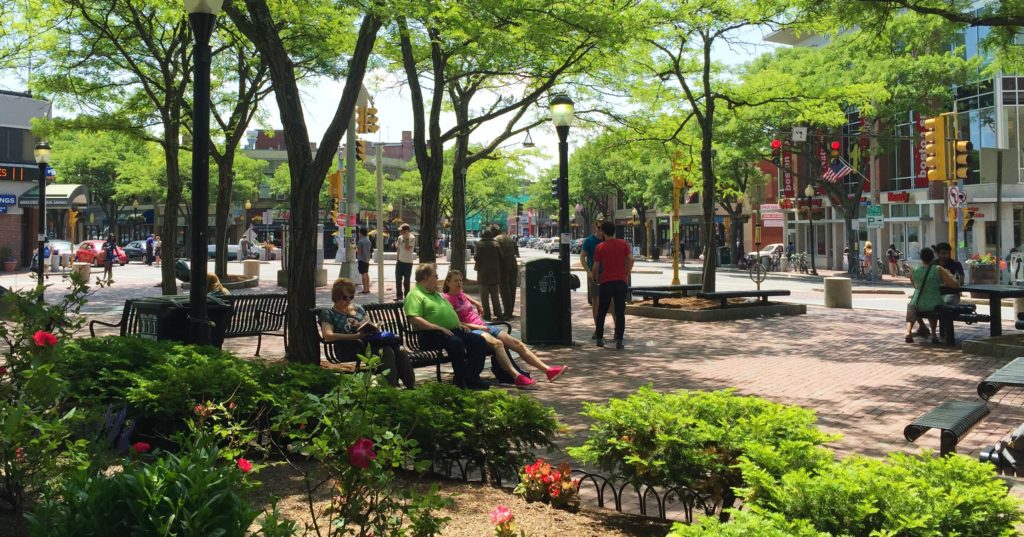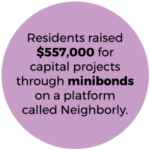The Squares & Main Streets section, renamed from “Commercial Corridors, Squares, and Growth Districts” as it appears in SomerVision 2030, includes a number of goals focused on commercial development in Somerville and how it relates to priorities like workforce development, fiscal responsibility, and job creation.

I. Promote municipal financial self-determination and reduce fiscal dependence on state aid and residential taxes and fees.
II. Make Somerville a regional employment center with a mix of diverse and high-quality jobs.
III. Support a business-friendly environment to attract and retain a diverse mix of businesses that can start here, grow here and stay here.
IV. Invest in the talents, skills, and education of people to support growth and provide opportunities to residents of all social and economic levels.
V. Link our corridors, squares, and growth districts to support future development and economic activity.
VI. Transform key opportunity areas, such as Assembly Square, Inner Belt, Brickbottom, Boynton Yards and the southeastern portion of Union Square into dynamic, mixed-use and transit-oriented districts that serve as economic engines to complement the neighborhoods of Somerville.
VII. Facilitate thoughtfully-designed, pedestrian-oriented mixed-use development and re-use opportunities in commercial corridors, squares and around transit stations that are sensitive to neighborhood context, and serve existing and future residents and businesses.
- District Improvement Financing (DIF): This tool has been invaluable for using anticipated property appreciation to pay for necessary infrastructure improvements. For example, the necessary sewer separation project currently underway in Union Square was paid for in part by the Union Square DIF and a number of infrastructure improvements in Assembly Square were funded by the Assembly DIF.
- Minibonds: In May 2018, the City partnered with Neighborly to offer Somerville residents the opportunity to purchase municipal minibonds. During the one-week sale, the minibonds sold out with 87 residents purchasing $557,000 worth of minibonds that will finance future capital projects.
- Powder House School Redevelopment: After the Powder House School was closed in 2005, the City went through a process to solicit bids to redevelop the site into an asset for the neighborhood. The winner of that process, MarKa, is currently constructing a project that includes market rate, affordable, and senior residential units, as well as commercial space including retail and maker space, and Powderhouse Studios, a small, new high school.
 iFund: The City has provided flexible financing for businesses with innovative products or models to help them move to or stay in Somerville. Examples include working capital loans to Greentown Labs and Somerville Brewing Company to help these businesses expand.
iFund: The City has provided flexible financing for businesses with innovative products or models to help them move to or stay in Somerville. Examples include working capital loans to Greentown Labs and Somerville Brewing Company to help these businesses expand.- Platinum Bio-Ready Community: The Massachusetts Biotechnology Council gave Somerville its highest designation for readiness to support biotech companies.
- Small Business Support: This program provides free coaching and reimbursement grants to qualifying small and home-based businesses in Somerville to help them stay competitive and profitable.
- Nibble: This Somerville Arts Council project provides culinary arts and entrepreneurial training to immigrants who are interested in turning their food into a business. They will be opening up their own space in Bow Market.
- CitizenServe: In 2014 the Inspectional Services Department launched the CitizenServe platform to enable online building permit applications, eliminating the need for paper-based application submissions. CitizenServe has since expanded to include the ISD Health Division, the City Clerk’s Office, Engineering, and Planning and Zoning. Business and property owners may now apply and renew online for numerous permits and licenses, including alcohol licenses, food establishment licenses, and engineering permits. Citizenserve also enables better tracking of building, health, and zoning code enforcement with a ticketing system. This system has increased collaboration across departments, improved customer service, and created a more business-friendly environment.
- Business Parking Permits: In 2013, the Traffic & Parking Department created a business permit program for employees of Somerville businesses to be able to park in underutilized spots during their shifts. These permits make it easier for businesses to retain employees and keep meter parking available for customers.
- Liquor Licenses: The City petitioned the state for additional city-owned licenses. Somerville has received an additional 45 licenses from the State and expects to receive an additional 32 licenses in 2019. These lower the barriers of entry for new entrepreneurs to open up restaurants and for existing businesses to remain competitive in Somerville’s growing culinary scene.
- Somerville Urban Lab RFI: In 2018, the City released a call for startups and inventors to pitch their social innovation projects to the City. Successful applicants will be invited to partner with the City to pilot new, innovative tools for housing, social equity, economic development, sustainability, arts, education, government innovation, smart city infrastructure, and public health.
- Somerville Community Corporation’s First Source Networking Cafe: SCC hosts a weekly networking session for job seekers to share their experiences, network with other job seekers, and learn about skills employers are looking for. This also provides a safe space for non-native English speakers to practice their language skills.
GET INVOLVED: If you’re looking for a new job, check out the next Networking Café!
- The Mayor’s Summer Jobs Program: This initiative provides a multitude of opportunities for youth of different ages and abilities who can work at the City during summer break. Recently, the City opened up this program for youth as young as 15 and provided the opportunity for applicants to disclose whether they would like an accommodation to help them apply or perform a job in the program.
- Signal Success: This program provided a new six-week job training curriculum program for youth aged 13-15 provides job skills to youth that may have limited access to alternative programs due to their age.


